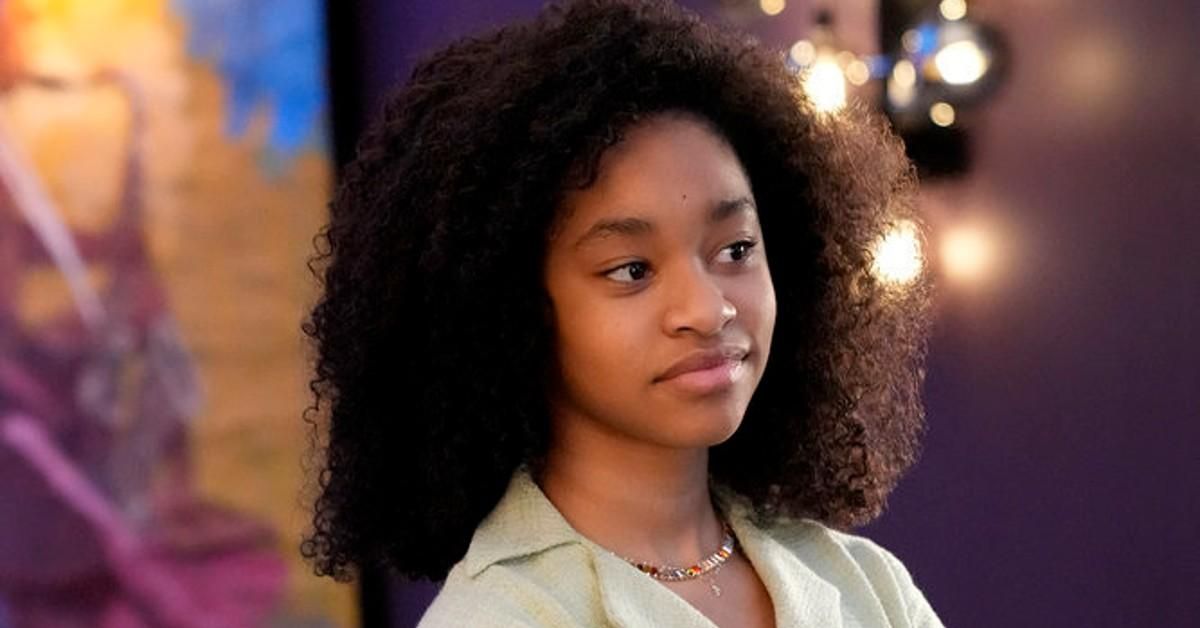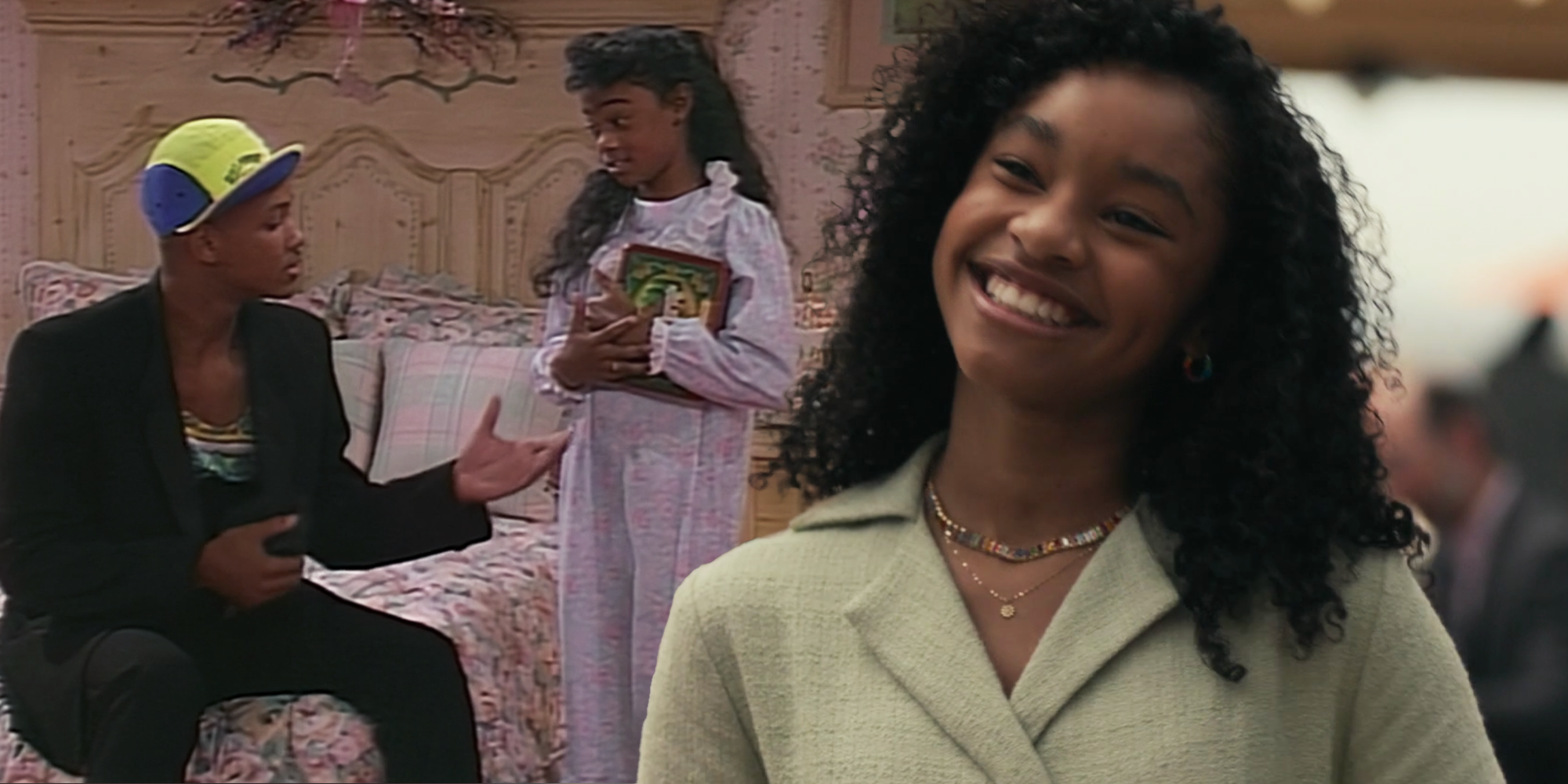The Fresh Prince of Bel-Air reboot, Bel-Air, continues to push new boundaries with its character development. While many fans enjoy the more dramatic, updated version of the Peacock original series, some are not happy with the changes.
Bel-Air, which premiered Sunday, February 13, 2022, has expanded from the 20-minute American comedy that we remember into a full-on hour-long drama. Jabari Banks plays Will, leading the new cast in this sitcom re-imagining, charting the highs and lows of Will Smith's journey throughout the ostentatious Bel-Air community.
Aside from Will's storyline, there are several differences from the original, particularly when it comes to character development. Aunt Viv, Carlton, Hilary, and most recent Ashley Banks, have made quite the jump from their original predecessors.
The Modern Ashley Banks
Carlton is no longer the dancing, khaki, and polo-clad rich teenager we remember. Now, Carlton, played by Olly Sholotan, is a ruthless villain who will do whatever it takes to take his cousin down. Hilary, played by Coco Jones, has grown from the air-headed older sister into a passionate culinary influencer. Even Aunt Viv (Cassandra Freeman), the matriarch of the Banks clan, gets an updated storyline as the reboot has expanded on her ambivalence about giving up her career.
Another significant character to get updated for the series is the youngest member of the Banks family, Ashley, to the dismay of many fans.
In the fifth episode, viewers follow twelve-year-old Ashley Banks, played by Akira Akbar, as she grapples with questioning her sexuality. Amid Hilary's soirée for her influencer friends, Ashley talks with one of the influencers, who specialize in sex positivity, about the future of sexuality, asking will it be more fluid and should younger generations embrace labeling. Later in the episode, Ashley confides in Hilary about her feelings and asks for relationship advice about one of her friends that she met online. Remarkably, Hilary was more than supportive and even joked that she wasn't surprised.
On the other hand, social media, particularly Twitter, wasn't as supportive. "Ashley Banks is gay on #BelAir," one viewer tweeted. "They really got a 12-year-old girl on TV talking about she's physically attracted to women, society really needs to stop sexualizing children." Some people even believe it's a conspiracy behind the new addition: "Ashley Banks being gay in the Bel-Air is a prime example of the film industry forcing LGBT representation on us."
Why LGBTQ+ Representation Matters
In 2022, why are LGBTQ+ characters on-screen still ruffling this many feathers? Historically, homosexuality has been a taboo in the Black community, and while many attitudes have changed, some have not. Reminiscent of the conversation surrounding Dave Chappelle and his 2021 Netflix original comedy special, The Closer, and his disparaging comments about the LGBTQ+ community, some viewers believe that reboot is trying to "push the gay agenda" in its effort to offer a more "woke" version of the sitcom.
With nearly 1.2 million people self-identifying as Black and LGBTQ+ in the United States, according to a 2021 study by the Williams Institute at UCLA School of Law, erasure has been a huge problem. To queer viewers, particularly Black queer folks, it's essential now more than ever for queer Black characters to be seen on TV and film. Following behind hit shows like FX's Pose and Netflix's Sex Education, Bel-Air continues to help break new ground for Black queer representation.
Despite this character being fictional, the storyline for many people is real. Many members of the queer find themselves questioning their sexuality at a young age, but unfortunately, they were not allowed to explore that journey until they were older. As the queer community continues to grow, the landscape of television and film should reflect that. According to a study by Gallup, the percentage of adults in the US who identify as LGBTQ+ has doubled over the past ten years, going from 5.6% in 2020 to 7.1 in 2021.
The study predicts that with 1 in 10 millennials and 1 in 5 Gen-Z members identifying as LGBTQ+, the proportion of LGBTQ+ American adults should exceed 10% in the near future.
Additionally, the data suggest that more than half of LGBTQ+ Americans -- nearly 57% -- identify as bisexual, making up 4% of the total US adult population. Twenty-one percent of LGBTQ+ Americans identify as gay, 14% lesbian, 10% transgender, and 4% something else.
"I call it "the Lil Nas X effect," executive producer and showrunner Rashad Newson told INTO. "As recently as three or four years ago, it would have been very hard to do the stories we're doing this season. But suddenly, Lil Nas X hit the scene, and we're celebrating [being queer] now. I've been waiting. I'm so glad that day has come. It's a lot easier now than it would have been at the beginning of my career, which makes me sound like I'm ancient. But even 15 years ago, proposing some of the stories we're playing, I just don't think they would have gotten to screen now."



